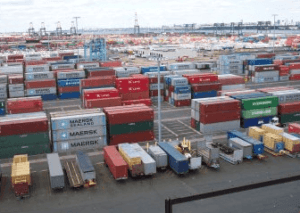Demurrage payment is preventable – Ghana Shippers Authority
 The Ghana Shippers Authority (GSA) says demurrage payment is preventable and that shippers and owners of containers must expedite the clearance process of cargo from the ports to jump the demurrage drain.
The Ghana Shippers Authority (GSA) says demurrage payment is preventable and that shippers and owners of containers must expedite the clearance process of cargo from the ports to jump the demurrage drain.
Mr Fred Asiedu Dartey, GSA Head of Freight and Logistics said by convention, once a container arrived at the port, owners had seven days to clear, and if a shipper failed to do that, they invariably deny the shipping line or the owner of the container the opportunity to give the empty container to the next user.
That, he noted, necessitated the introduction of demurrage – a charge payable by an owner of goods in a container for failing to discharge or clear it beyond the allowable period of seven days.
Mr Asiedu-Dartey was speaking at the fifth, “GNA-Tema Stakeholder Engagement and Workers’ Appreciation Day,” seminar at the Tema Regional Office of the Ghana News Agency, which is a progressive media caucus platform created to give an opportunity to state and non-state actors to interact with journalists and address national issues.
The event also serves as a motivational mechanism to recognize the editorial contribution of reporters to the professional growth and promotion of the GNA Tema Regional Branch as the industrial news hub, while contributing to national development.
Speaking on the topic: “Emerging trends in Ghana’s maritime industry – the perspective of the Ghana Shippers Authority,” Mr Asiedu-Dartey noted, “not only are shippers paying demurrage for not clearing early, but the port authority also charges cargo owners for rent.”
Mr Asiedu-Dartey said a research conducted by the authority revealed that, from January to December 2010, through all the importation that had come in, Ghanaians had paid about $40 million as demurrage.
As an intervention to nip the trend in the bud, he said, around 2017, the paperless port project was introduced and as a result of the policy demurrage payments have reduced drastically.
Explaining the typical schedule for container demurrage, Mr Asiedu-Dartey noted that the first seven days of the arrival of a container is free, and encouraged importers to take advantage of the period to clear their goods.
He said ,however, from the eighth to the 14 days the importer pays $22.00 (GH¢110.00) per day for a 20 footer container and $44.00 (GH¢220.00) for a 40 footer container; from the 15th to the 21st day, the charge moves up sharply as the importer would pay $35.00 (GH¢175.00) per day for 20 footer container and $70.00 (GH¢350.00) for a 40 footer container.
He said after 21 days, the charge for 20 footer container is pegged at $48.00 (GH¢ 240.00) daily and $96.00 (GH¢480.00) for a 40 footer container.
He said, the Ghana Shippers Authority has also intensified a nationwide sensitization on demurrage.
Mr Asiedu-Dartey mentioned bureaucratic operational procedures, System Issues – changes in cargo clearance platforms, delays at the Customs Technical Services Bureau (CTSB), and delays in exemption or permit processing.
Others include questionable professional competence of some Clearing Agents, errors in declarations, cash flow issues, deliberate delay for ulterior motives, as some underlying causes of demurrage at the ports.
He indicated that, to effectively and efficiently protect and promote the interests of shippers in the country’s commercial shipping sector, the Authority had rolled out various services and sensitisation programmes.
The GSA has initiated the Shipper Education Service, Shipper Advisory Services, Advocacy Services, and Research and Information Services.
He said the GSA with industry stakeholders were committed to delivering solutions that would ensure the development of the maritime industry in the country and the competitiveness of shippers.
Other speakers included: Dr Stephen Ayisi-Addo, Programme Manager National AIDS/STI Control Programme who spoke on: “Workplace policy on HIV/AIDS, who enforces it: the legal basis for churches demanding HIV/AIDS test from would be partners? Role of partners of infected individual”.
Mr Timothy Anyidoho a Senior Staff, Lands Commission, and Mr George Okwabi Frimpong, a member of the License Surveyors Association of Ghana spoke on: “the authority in charge of the management of stool or skin, clan or family lands; the role of Customary Land Secretariat; Systems of recording and registering land and interests in land; What is electronic conveyancing; and Procedures under the Alternative Dispute Resolution Act, 201”.
Source: GNA
